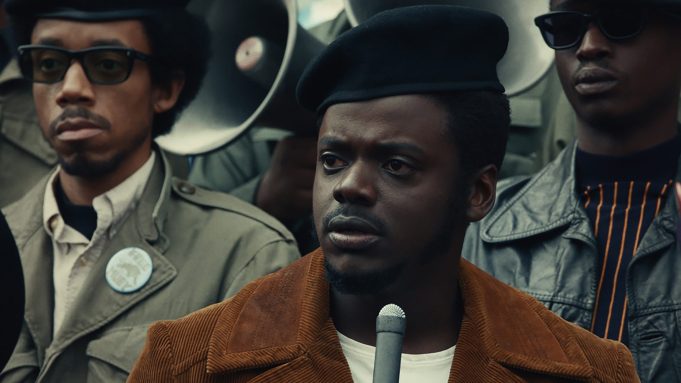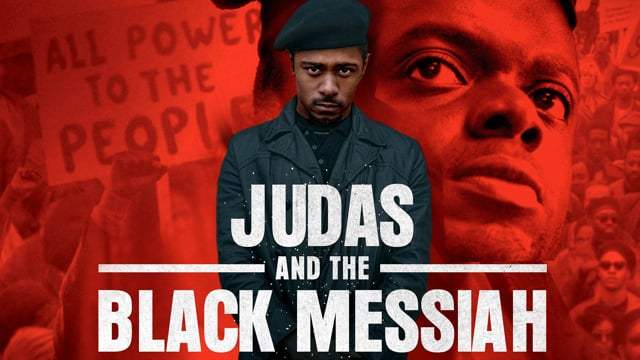Judas and the Black Messiah is currently an Oscar nominee for Best Picture, Best Original Screenplay, Best Cinematography, Best Original Song, and Best Supporting Actor. (In a move that left quite a few people feeling confused, the Academy nominated both of the film’s leads — LaKeith Stanfield and Daniel Kaluuya — in the supporting category.) In detailing how, in 1969, Black Panther leader Fred Hampton (played by Kaluuya) was assassinated by the FBI and the Chicago police, it tells a true story that should leave any viewer, regardless of political orientation, shaken.
What’s interesting is that, in several Oscar categories, Judas and the Black Messiah will be competing with another fact-based film about 60s activists, Aaron Sorkin’s The Trial of the Chicago 7. In fact, Hampton briefly appears as a character in The Trial of the Chicago 7 and a key scene involves lawyer William Kunstler and Black Panther Bobby Seale discussing Hampton’s murder. Of course, in Sorkin’s film, the Black Panthers don’t get to say much. They appear in the background of the courtroom a few times and it’s hard not to feel that Sorkin is largely using them as props, as a way to let us know that he and the Chicago 7 are all on “the right side of history.” After the scene in which he learns that Hampton’s been murdered, Bobby Seale basically disappears from the film and the rest of The Trial of the Chicago 7 focuses on seven rich white guys debating whether or not it’s better to be serious while protesting or to try to have fun. I point this out not merely to criticize The Trial of the Chicago 7 but also to illustrate that, though they deal with the same time period and the same themes, Judas and the Black Messiah and The Trial of the Chicago 7 are as different as night and day. Judas and the Black Messiah is an angry and unapologetically political film, one that reveals just how anodyne The Trial of the Chicago 7 actually is. If The Trial of the Chicago 7 is carefully calculated to be a crowd pleaser, Judas and the Black Messiah is about leaving the audience outraged. If The Trial of Chicago 7 is about ultimately assuring the audience that the system works even if it is occasionally corrupted, Judas and the Black Messiah is a call to burn the entire system down.
The film opens with Bill O’Neal (LaKeith Stanfield) getting arrested for both auto theft and impersonation of a federal officer in Chicago. He’s approached by FBI agent Roy Mitchell (Jesse Plemons). Mitchell has an offer for Bill. Mitchell is willing to have the charges dropped if Bill will agree to work undercover for the FBI. Bill accepts Roy’s offer and is assigned to infiltrate the Illinois chapter of the Black Panthers. The chapter is currently led by Fred Hampton, a charismatic revolutionary who has been going around to all of the other activist groups and gangs in Chicago and building a multi-racial coalition, one dedicated to social justice and economic equality. Under the direction of J. Edgar Hoover (Martin Sheen, made up to look as grotesque as possible), the FBI is looking to destroy the Black Panthers from within.

Bill agrees to work for the FBI and infiltrate the Black Panther Party. Soon, he not only wins Hampton’s trust but he also works his way up the ranks until he’s promoted to being head of security. He also grows close to Hampton and starts to respond to Hampton’s message of self-determination. However, Mitchell insists that Bill continue to inform on the Panthers, arguing that the Panthers will kill Bill if they ever discover that he’s working with the FBI and also that Hampton himself is a dangerous radical. (Mitchell brags about how he worked to solve the murder of three civil right workers in Mississippi before then comparing Hampton and the Panthers to the KKK.) With Hampton gathering more followers and Hoover demanding that something be done to “neutralize” him, Bill is ordered to betray the man that many have come to view as being the black messiah.
Daniel Kaluuya gives a mesmerizing performance as Fred Hampton. It’s one thing to play a character who everyone insists is a charismatic leader but it’s another thing to give a performance that convinces the audience that the character is a charismatic leader before anyone else has even said a word about him. Kaluuya strides through the film, playing Hampton as a man who knows that he’s destined to change the world. The scenes where he meets with gang leaders and other activist leaders and recruits them into his Rainbow Coalition could have played like simple agitprop (just imagine if Aaron Sorkin had written or directed them!) but Kaluuya is so convincing that you never have any doubt that people actually would abandon their prejudices and their rivalries to follow him. Unlike the quippy activists at the heart of The Trial of the Chicago 7, Kaluuya-as-Hampton actually discusses what his ideology means and also why the system cannot be depended upon to sort itself out. Kaluuya’s Hamtpon challenges not only the film’s villains but also the complacency of the viewers, something that definitely cannot be said of the characters in Aaron Sorkin’s far more comforting film.
LaKeith Stanfield has a difficult role because Bill is a character who most viewers are going to feel ambiguous about but he does a good job of capturing both Bill’s growing consciousness and his growing desperation as he comes to realize that there’s no way to escape the situation in which he’s found himself. Finally, Jesse Plemons is well-cast as Roy Mitchell, who is alternatively threatening and consoling to Bill. A lesser actor would have played Mitchell as just being a straight-up villain but Plemons plays him as someone who truly does believe that he’s one of the good guys, which makes Mitchell’s actions all the more disturbing.
Judas and the Black Messiah is a powerful and angry film. One need not even agree with every bit of Hampton’s ideology to be outraged by the federal government’s efforts to silence his voice and end his life. Judas and the Black Messiah is not expected to win much on Sunday night and, indeed, by nominated both Kaluuya and Stanfield in the same category, the Academy has created a situation in which the two could potentially split the vote and prevent either one from winning. Still, regardless of what it does or doesn’t win this weekend, Judas and the Black Messiah a film that will probably continue to resonate after many of the other nominees have been forgotten.

Pingback: 6 Actors Who I Hope Win An Oscar In The Next Ten Years: 2021 Edition | Through the Shattered Lens
Pingback: Lisa’s Week In Review: 4/19/21 — 4/25/21 | Through the Shattered Lens
Pingback: Lisa Marie’s Oscar Predictions for January | Through the Shattered Lens